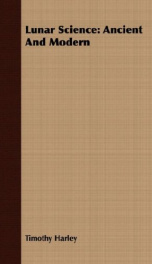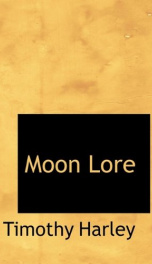lunar science ancient and modern

LUNAR SCIENCE. ANCIENT AND, MODERN. - I886. - INTRODUCTION - By Thy command, the moon, as daylight fades, Lifts her broad circle in the deepning shades Arrayd in glory, and enthroned in light, She breaks the solemn terrors of the night Sweetly inconstant in her varying flame, She changes still, another, yet the same Now in decrease, by slow degrees she shrouds Her fading lustre in a veil of clouds Now at increase, her gathering beams display A blaze of light, and give a paler day Ten thousand stars adorn her glittering train, Fall when she falls, and rise with her again, And oer the deserts of the sky unfold Their burning spangles of sidereal gold Through the wide heavens she moves serenely bright, Queen of the gay attendants of the night Behold a new spectacle of wonder The moon is making her entry on the eastern sky. See her rising in clouded majesty opening, as it were, and asserting her original commission to rule over the night all grand and stately, but somewhat sullied in her aspect. However, she brightens as she advances, and grows clearer as she climbs higher, till at length her silver loses all its dross she unveils her peerless light, and becomes the beauty of heaven, the glory of the stars Eccles. xliii. g, delighting every eye, and cheering the whole world with the brightness of her appearance and the softness of her splendours. THIS passage from a once noted but now neglected book, eloquently directs us to the sphere of our present inquiries. Whatever our degree in the artificial scale of human society, whatever our profession in the arduous service of human toil, we all are more or less moved by the divinity that stirs within us to feel an interest in the edifices of the Divine Architect and the embellishments of the Divine Artist. Sir George Cornewall Lewis said truly The history of astronomy has numerous points of contact with the general history of mankind and it concerns questions which interest a wider class than professed astronomers, for whose benefit the existing histories have been mainly composed. No scripture, whether spiritual or scientific, which is of public interest, ought to be of private interpretation...
Info about the book
Author:
Series:
Unknown
ASIN:
B00089C18M
Rating:
3/5 (2)Your rating:
0/5
Languge:
English
Users who have this book
Users who want this book
What readers are saying
What do you think? Write your own comment on this book!
write a commentif you like lunar science ancient and modern try:
Other books by this author
Do you want to exchange books? It’s EASY!
Get registered and find other users who want to give their favourite books to good hands!


